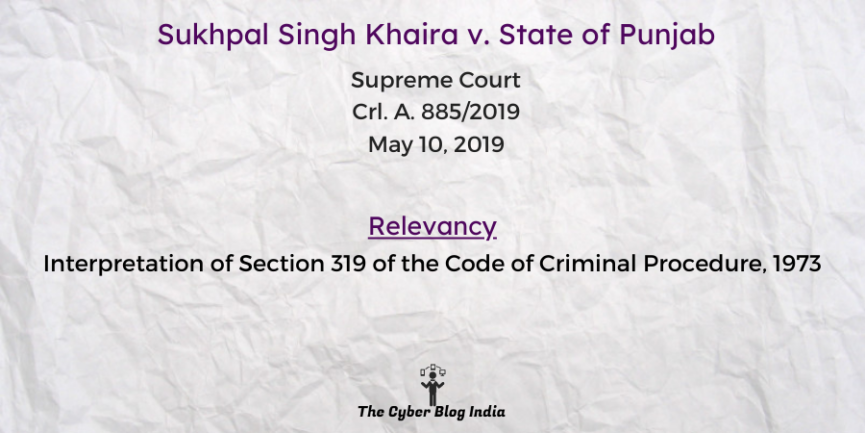Sukhpal Singh Khaira v. State of Punjab

Sukhpal Singh Khaira v. State of Punjab
(2019) 6 SCC 638 : (2019) 2 SCC (Cri) 883
In the Supreme Court of India
Crl. A. 885/2019
Before Justice N.V.Ramana and Justice M.M. Shantanagoudar
Decided on May 10, 2019
Relevancy of the case: Interpretation of Section 319 of the Code of Criminal Procedure, 1973
Statutes and Provisions Involved
- The Information Technology Act, 2000 (Section 66)
- The Code of Criminal Procedure, 1973 (Section 319, 311, 235, 360, 354, 353) (“CrPC”)
- The Arms Act, 1959 (Section 25A)
- The Narcotic Drugs and Psychotropic Substances Act, 1985 (Section 21, 24, 25, 27, 28, 29, 30)
Relevant Facts of the Case
- The police registered a case under the N.D.P.S. Act against 11 accused. As one of the accused was unavailable, his case was bifurcated.
- On July 21, 2017, the prosecution submitted an application under Section 319 to summon the applicant.
- On October 31, 2017, the court pronounced the judgment in the initial case registered against the 11 accused. The court also allowed the application under Section 319 and passed an order summoning the applicant to face trial.
- The appellant challenged the order based on the fact that the stage at which it was passed was not ‘proceeding pending before the court’.
- The High Court ruled that Section 319 can only operate at a stage before the pronouncement of the judgment. However, the trial court can summon an accused based on the evidence in the bifurcated case but not on the evidence collected in the concluded trial.
- The appellant has challenged the High Court’s order before the Supreme Court.
Prominent Arguments by the Advocates
- The appellant’s counsel:
- The High Court’s order was invalid as the trial court had already concluded the trial.
- He relied on Hardeep Singh v. State of Punjab to emphasise the power under Section 319.
- He contended that this violation is not just procedural but substantial in nature.
- The trial court seeks to violate the principle of commonality of evidence as the same evidence would be reappreciated.
- The respondent’s counsel:
- Regarding the applicability of Section 319, the application of mind happened during the pendency of the trial.
- The High Court set aside the application to expedite the trial. This cannot be held to prejudice the state’s case. As the court passed the order along with the judgment, there is no procedural irregularity.
- Moreover, a court should consider procedural laws liberally to render justice.
Opinion of the Bench
- The appellant has relied heavily on the Hardeep Singh case to emphasise that the trial court is functus officio at the stage of passing the order.
- The High Court relied on Shashikant Singh v. Tarkeshwar Singh while deciding the appellant’s appeal. However, the mandate of a fresh trial is mandatory in nature.
- A bench of this size cannot dilute the Hardeep Singh judgment. It would be appropriate to place the matter before a larger bench.
Final Decision
- The court directed the Registry to place the matter before the Chief Justice for constituting an appropriate bench to decide the issue.
